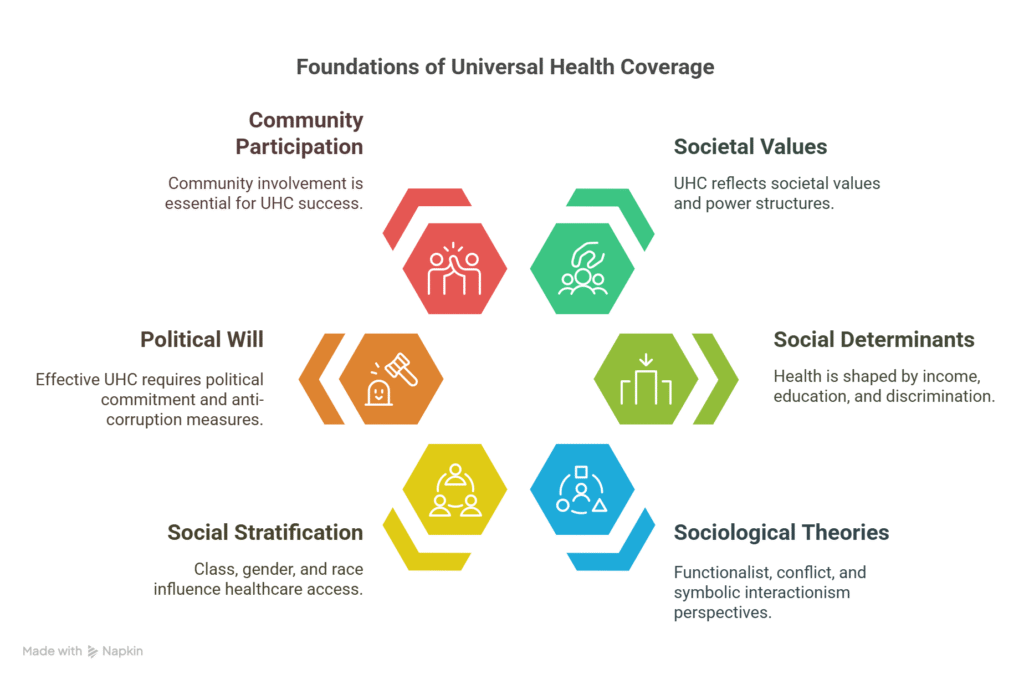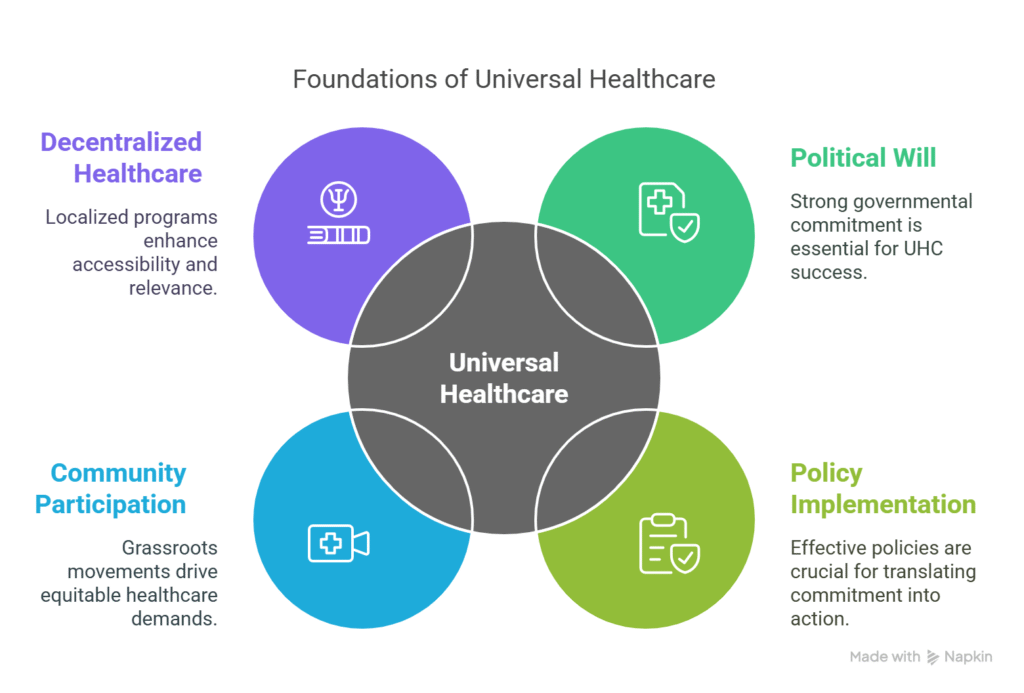
Introduction on Universal Health Coverage
Universal Health Coverage (UHC) is a global health policy goal aimed at ensuring that all individuals and communities receive the health services they need without suffering financial hardship. The World Health Organization (WHO) defines UHC as encompassing the full spectrum of essential, quality health services, from health promotion to prevention, treatment, rehabilitation, and palliative care. While UHC is often discussed in terms of health economics and public policy, its sociological dimensions are equally critical.
From a sociological perspective, UHC is not merely a technical health policy but a reflection of societal values, power structures, and inequalities. It intersects with issues of social justice, equity, and human rights. This article explores UHC through a sociological lens, examining its implications for social stratification, access to healthcare, and the role of governance in shaping health outcomes.
1. The Sociological Foundations of Universal Health Coverage
1.1 Health as a Social Determinant
Sociologists argue that health is not just a biological condition but a social construct influenced by economic, political, and cultural factors. The social determinants of health—such as income, education, employment, housing, and social inclusion—play a crucial role in shaping health outcomes. UHC seeks to mitigate these disparities by providing equitable access to healthcare services.
- The Link Between Health and Social Inequality: Research shows that marginalized groups (low-income populations, racial minorities, women, and rural communities) face greater health disparities due to limited access to healthcare. UHC aims to reduce these gaps by ensuring that healthcare is not a privilege but a right.
- The Role of Social Institutions: Family, education, and labor markets influence health behaviors and access to care. For instance, unemployed individuals may lack health insurance, while educated populations are more likely to seek preventive care.
1.2 The Functionalist Perspective on UHC
From a functionalist viewpoint, health systems contribute to societal stability. Talcott Parsons’ concept of the “sick role” suggests that society has an interest in maintaining a healthy workforce. Universal Health Coverage supports this by ensuring that individuals can return to productive roles after illness.
- Healthcare as a Social Institution: Just like education and law, healthcare is a fundamental institution that maintains social order. Universal Health Coverage reinforces societal cohesion by preventing health-related financial crises.
- Critique of Functionalist Approach: Critics argue that functionalism overlooks power imbalances in healthcare access. While Universal Health Coverage may promote stability, it does not always address systemic inequalities embedded in health systems.
1.3 Conflict Theory and Universal Health Coverage
Conflict theory emphasizes how power dynamics and economic inequalities shape healthcare access. Karl Marx’s ideas on class struggle apply here—wealthier groups often have better healthcare, while the poor face barriers.
- Privatization vs. Public Health: In many countries, healthcare is commodified, leading to profit-driven systems that exclude the poor. UHC challenges this by advocating for public financing and equitable distribution.
- Corporate Influence on Health Policy: Pharmaceutical companies and private insurers often resist UHC reforms to protect profits, reinforcing health inequities.
1.4 Symbolic Interactionism and Patient Experiences
Symbolic interactionism emphasizes the ways in which individuals understand and engage with healthcare. Stigma, cultural beliefs, and doctor-patient interactions influence health-seeking behaviors.
- Stigma and Healthcare Access: Mental health patients, HIV/AIDS sufferers, and drug users often avoid care due to societal stigma. Universal Health Coverage must address these social barriers.
- Cultural Competence in Healthcare: Effective Universal Health Coverage requires culturally sensitive services that respect diverse patient backgrounds.
2. UHC and Social Stratification
2.1 Class and Healthcare Access
The economic condition significantly influences access to healthcare. UHC seeks to eliminate financial barriers, but implementation varies:
- High-Income Countries: Nations like the UK (NHS) and Canada provide tax-funded healthcare, reducing class-based disparities.
- Low-Income Countries: Many lack infrastructure for Universal Health Coverage, leading to reliance on out-of-pocket payments, which exacerbate poverty.
2.2 Gender Disparities in Healthcare
Women often face unique health challenges, including maternal care, reproductive rights, and gender-based violence.
- Maternal Health: UHC can reduce maternal mortality by ensuring access to prenatal and obstetric care.
- Gender Bias in Treatment: Studies show women’s pain is often undertreated compared to men’s. UHC policies must address such biases.
2.3 Racial and Ethnic Health Inequities
Minority groups frequently experience worse health outcomes due to systemic racism and discrimination.
- Structural Barriers: Indigenous populations, migrants, and ethnic minorities often have less access to quality care.
- UHC as a Tool for Equity: Policies must actively target marginalized groups to ensure inclusivity.
3. The Role of Governance and Policy in UHC

3.1 Political Will and Policy Implementation
UHC requires strong governmental commitment. Countries with robust welfare states (e.g., Scandinavian nations) achieve better UHC outcomes.
- Corruption and Mismanagement: In some nations, health funds are misappropriated, weakening UHC efforts.
- Global Health Organizations: WHO and UNICEF advocate for UHC, but national policies determine success.
3.2 Community Participation in Health Systems
Grassroots organizations and civil society are essential in advocating for fair healthcare access.
- Social Movements for Health Rights: Activism (e.g., HIV/AIDS advocacy in the 1980s) has driven policy changes.
- Decentralized Healthcare: Localized health programs improve accessibility and cultural relevance.
4. Challenges to Achieving UHC
4.1 Financial Constraints
Many governments struggle to fund UHC due to budget limitations.
- Taxation vs. Insurance Models: Debate continues over the best financing mechanism.
- Global Economic Inequalities: Low-income nations rely on foreign aid, which is often unstable.
4.2 Bureaucratic and Administrative Barriers
Complex health systems can hinder efficient service delivery.
- Digital Health Solutions: Technology (e.g., telemedicine) can improve access but requires infrastructure.
- Health Workforce Shortages: Many countries lack enough doctors and nurses for Universal Health Coverage.
4.3 Cultural and Behavioral Resistance
Some communities distrust formal healthcare systems, preferring traditional medicine.
- Health Literacy Programs: Educating populations on Universal Health Coverage benefits is crucial.
- Religious and Ethical Concerns: Policies must balance medical ethics with cultural beliefs (e.g., vaccinations).
5. Conclusion: Universal Health Coverage as a Societal Imperative
Universal Health Coverage is more than a health policy—it is a reflection of societal values. From a sociological standpoint, achieving Universal Health Coverage requires addressing deep-rooted inequalities, empowering marginalized groups, and fostering inclusive governance. While challenges remain, the global push for UHC represents a commitment to social justice and human dignity. By integrating sociological insights into health policy, nations can build more equitable and sustainable health systems for all.

Topic Related Questions
5-Mark Questions (Short Answer)
- Define Universal Health Coverage (UHC) from a sociological perspective.
- How does conflict theory explain healthcare inequalities?
- What are the key social determinants of health?
- How does stigma affect healthcare access?
- What is the functionalist view of healthcare systems?
- How does economic status influence healthcare access?
- What role do gender disparities play in healthcare?
- How does symbolic interactionism explain patient-doctor relationships?
- What are the major challenges in implementing UHC?
- Why is political will important for UHC?
10-Mark Questions (Brief Essay)
- Discuss the relationship between social stratification and healthcare access.
- Explain how UHC can reduce health inequalities using sociological theories.
- Analyze the impact of privatization on healthcare accessibility.
- How do cultural beliefs and practices influence health-seeking behavior?
- Evaluate the role of government policies in achieving UHC.
- Discuss the barriers marginalized communities face in accessing healthcare.
- Compare the functionalist and conflict perspectives on UHC.
- How does globalization affect the implementation of UHC?
- Examine the role of community participation in strengthening UHC.
- Why is gender-sensitive healthcare important for UHC?
15-Mark Questions (Long Essay)
- Critically analyze UHC as a tool for social justice, using sociological theories.
- Discuss how race, class, and gender intersect to create healthcare disparities.
- Evaluate the challenges and opportunities in achieving UHC in developing countries.
- How can sociopolitical factors hinder or promote the success of UHC?
- Examine the role of international organizations (e.g., WHO) in advancing UHC globally.
- “Healthcare is a right, not a privilege.” Discuss this statement in the context of UHC.
- How does neoliberalism impact the implementation of UHC?
- Analyze the influence of corporate power (pharmaceutical companies, private insurers) on UHC policies.
- Discuss the importance of health literacy in achieving equitable healthcare access.
- What policy measures can governments adopt to ensure inclusive UHC?
Like this this Post? You Can follow as on :-
Facebook – https://www.facebook.com/hubsociology
Whatsapp Channel – https://whatsapp.com/channel/0029Vb6D8vGKWEKpJpu5QP0O
Gmail – hubsociology@gmail.com
